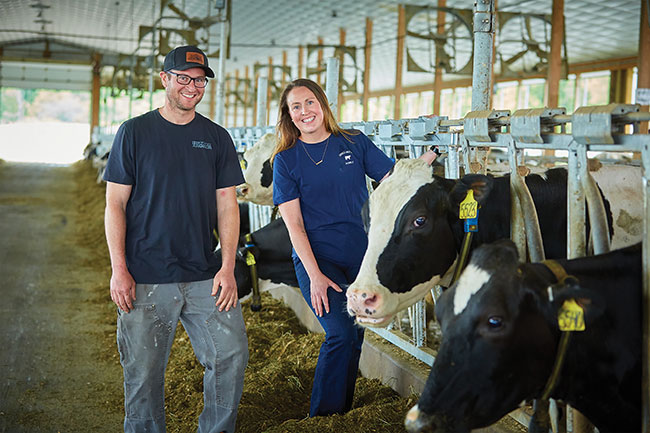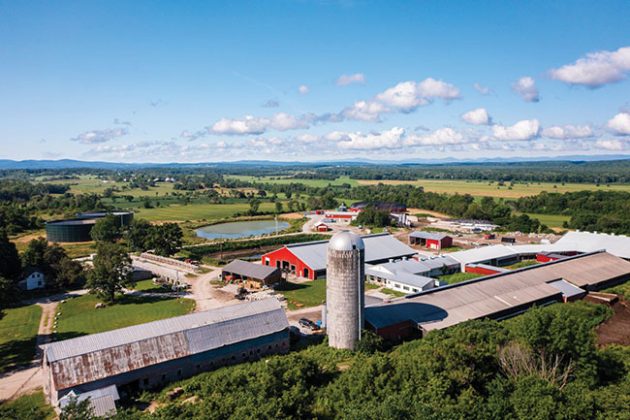
Features
Q&A: What does next-generation sustainability look like?
In July, the Innovation Center for U.S. Dairy has awarded Goodrich Farm with the 2021 Outstanding Dairy Farm Sustainability Award, saying the farm was “invested in the future.”
December 17, 2021 by Rebecca Hannam
 Chase Goodrich and Danielle Goodrich Gingras are continuing their family’s traditions.
Photo courtesy of Vanguard Renewables.
Chase Goodrich and Danielle Goodrich Gingras are continuing their family’s traditions.
Photo courtesy of Vanguard Renewables. Sustainability isn’t new for the family behind Goodrich Farm, but they do have a new way of reducing their environmental footprint. In addition to cows and crops, the Salisbury, Vermont farm started producing renewable natural gas last July.
Currently the largest anaerobic facility in the northeast U.S., Goodrich Farm is home to two 925,430-gallon digesters and hydrolyzer and phosphorus management systems. It’s made possible by a partnership between the farm, Vanguard Renewables, Middlebury College and Vermont Gas Systems (VGS).
Goodrich Farm was recently recognized with a 2021 Outstanding Dairy Farm Sustainability Award from the Innovation Center for U.S. Dairy. Third-generation farmer Danielle Goodrich Gingras is proud of her family’s innovations and shares their story here.
Manure Manager: Tell me about your family farm. How long have you been farming? Who’s involved in the operation?
Danielle Goodrich Gingras: My grandparents started our farm in 1956 with 10 cows. My dad, Ernie, got involved two years later and farmed together with my grandfather for many years. In 2009, my brother Chase graduated with a bachelor’s degree from Salve Regina University and I completed a two-year dairy management program at Vermont Technical College. We both returned to the farm and started to take over some management roles. My dad, Chase and his wife, and my husband and I are involved today.
We are currently milking 900 cows and farming 1700 acres of hay and 750 acres of corn. It’s a big undertaking, but it is an honour to work with my brother and dad. We love what we do.
MM: How long did you spend looking into digesters and planning yours? What made this project become a reality?
DGG: Over a decade ago one of my college professors was approached with the idea to heat Middlebury College with methane. He thought of us and knew we would be a good fit – Chase and I were young and innovative and located only seven miles from the college.
He connected us with a developer and we started the conversation and permitting process. Unfortunately, this developer hit a dead end so the project stalled until we were put in touch with another company.
Middlebury College connected us with [John Hanselman, founder and CEO] and the team at Vanguard Renewables. We started by meeting and discussing what we wanted to do. Each partner shared their goals and we found out that everyone’s vision aligned.
From there, it took years of planning, obtaining permits and construction to finally make our dream of putting natural gas in the pipeline a reality. The permitting process took a long time and the COVID-19 pandemic caused many construction delays.
MM: How much manure does your farm produce for the digester? What is the outcome in terms of energy?
DGG: We put in 100 tons of dairy manure every day. There is also a daily capacity of 180 tons of food and beverage waste that Vanguard Renewables contracts from various sources.
The digester produces 180,000 Mcf of natural gas annually. It’s the equivalent of heating approximately 4000 homes and taking 2000 cars off the road for a year.
There is a natural gas pipeline from the facility to Middlebury College. The gas goes into the gas grid and the college gets the credits, but any residents located along the route can pipe themselves in if they want to.
MM: What does it mean to be a host farm?
DGG: Being a host farm means that Vanguard Renewables develops, owns and professionally operates the Farm Powered Anaerobic Digestion facility.
The key for us is that the farm is not responsible for any of the development or operating costs. We lease the land that the digester is on and receive a monthly payment from Vanguard Renewables in return.
Middlebury College and VGS are committed to the viability of the project but these contracts are the responsibility of Vanguard Renewables as well.
As farmers, our only responsibility is to supply manure and provide the land that the buildings are on.

An overhead view of Goodrich Farms, which formerly stored its manure in on-site manure ponds.
Photo courtesy of Vanguard Renewables.
MM: Thinking about the digester facility overall, how does your farm benefit?
DGG: The lease payment for land use diversifies our farming income.
In addition, a major cost-benefit to the farm is the use of the digestate. The digester produces about 80,000 tons of low-carbon, low-odor digestate per year and we spread that onto our fields. Starting next year, we are hoping to eliminate the majority of our commercial fertilizer use and replace it with digestate as much as possible. We estimate that this is going to lower fertilizer expenses by $200,000 every year.
The facility also has a phosphorus removal system which allows us to precisely take the phosphorus out of the manure. By doing this, we’re able to apply nutrients to the fields more purposefully and really do a better job of caring for our watersheds. The environmental impact is really important to us, especially because we’re located in a high risk area near Otter Creek, which feeds into Lake Champlain.
We also use all of the separated solids for animal bedding in the barns. This alone saves the farm about $50,000 in annual expenses.
MM: Prior to the digester, how did you manage your manure?
DGG: Before the digester, we had manure in ponds on-site. We worked with a trucking company to spread and inject manure onto our fields. We also had an on-site solid separator so we were able to use the manure solids for animal bedding. Now, all of the manure goes into the digester.
MM: What would you say to a farmer who is on the fence about digesters?
DGG: Building a digester on your own is a big risk so be aware that there are companies like Vanguard Renewables out there. Even if you can do it on your own, I think it’s a good idea to get into ownership with a partner. It starts by talking to potential partners and having in-depth conversations to make sure your goals align.
It can be a lengthy process, so you have to be patient. Before you make a long term commitment, It’s also important to make sure that the partners trust and respect each other, and that there’s a good line of communication between them.
MM: What other ways are you working to improve sustainability and protect the environment?
DGG: We have always worked with a consulting company for large farm operations. They come in and do soil testing so that we can spread manure based on the results.
We also use no-till and cover crop practices as much as we can to reduce phosphorus run-off and better the environment. Improving our environmental impact is very important to us. •